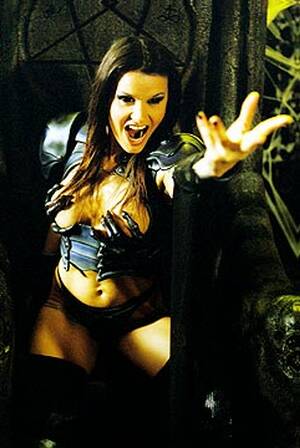★★★★
“Bringing a new meaning to Girls With Guns… “

 Grindhouse harkens back to an earlier time, when the only way to see cult or obscure movies was at your local fleabag cinema or drive-in. There was an entire industry of low-budget studios, like AIP, set up to create product for these outlets: knowing they couldn’t hope to compete in the areas of stars or general quality, they resorted instead to the old stand-bys of sex and violence. They flourished, roughly from the sixties to the end of the seventies, but the steady rise of home-entertainment media spelt their death-knell – at least as far as theatrical releases went. However, their films were an influence on many film-makers, and some of them have teamed up to bring you this love-letter to the genre, of the sort probably not seen for a couple of decades.
Grindhouse harkens back to an earlier time, when the only way to see cult or obscure movies was at your local fleabag cinema or drive-in. There was an entire industry of low-budget studios, like AIP, set up to create product for these outlets: knowing they couldn’t hope to compete in the areas of stars or general quality, they resorted instead to the old stand-bys of sex and violence. They flourished, roughly from the sixties to the end of the seventies, but the steady rise of home-entertainment media spelt their death-knell – at least as far as theatrical releases went. However, their films were an influence on many film-makers, and some of them have teamed up to bring you this love-letter to the genre, of the sort probably not seen for a couple of decades.
The structure closely mimics the original double-features, with an opening trailer, Rodriguez’s entry, Planet Terror, three more trailers, and then Tarantino’s film, Death Proof. What you take away from these will largely depend on what you bring: a knowledge of the low-budget horror, action and SF genres will enormously increase your enjoyment here. But, really – can anyone possibly resist the lure of a trailer (directed by Rob Zombie) for a film called Werewolf Women of the S.S.? With Sybil Danning? Udo Kier? And Nicolas Cage playing Fu Manchu? Where do we queue?
Planet Terror is a zombie flick. That’s really about all you need to know – but if you insist: the accidental release of gas from a military base causes the local population to turn into ravenous monsters. It’s up to pissed-off go-go dancer Cherry (McGowan) and her former boyfriend (Freddie Rodriguez) to take care of the issue before the entire world gets infected. The result is a phenomenally-gory homage, to a genre which has undergone something of a renaissance in the past couple of years. It’s clear that Rodriguez the director has a great love for these works, and brings all his favourite moments to his work here.
 There’s a fine sense of escalation, from the relatively-subdued opening, through to the insane climax, in which Cherry – now fitted with an automatic weapon in place of a limb which was torn off her during an earlier attack – takes on an entire army of the undead. Ludicrous? Over-the-top? Nonsensical? Hell, yes. Wouldn’t have it any other way. About the only weakness is a tendency to go overboard with the trappings of grindhouse flicks, such as missing reels, scratched film, etc. far beyond the point at which it’s amusing. We get it. I said, we get it. Thank you. Fortunately, the DVD should have the “restored” i.e. un-screwed with version.
There’s a fine sense of escalation, from the relatively-subdued opening, through to the insane climax, in which Cherry – now fitted with an automatic weapon in place of a limb which was torn off her during an earlier attack – takes on an entire army of the undead. Ludicrous? Over-the-top? Nonsensical? Hell, yes. Wouldn’t have it any other way. About the only weakness is a tendency to go overboard with the trappings of grindhouse flicks, such as missing reels, scratched film, etc. far beyond the point at which it’s amusing. We get it. I said, we get it. Thank you. Fortunately, the DVD should have the “restored” i.e. un-screwed with version.
Despite McGowan, the second entry is really what pushes this into action-heroine territory. It pits Stuntman Mike (Russell) against three women, who have taken a classic car out for a test-run. Now, the first half establishes that Mike is a total psychopath – basically, he’s a serial killer, who uses his vehicle as a way to murder and get away with it. However, when it comes to his latest victims, he may have bitten off more than he can chew as they include a professional driver (Rosario Dawson) as well as a stuntwoman (Bell), both enjoying a couple of days away from the film on which they’re working.
 This section has the usual problem of Tarantino movies: he’s in love with his own dialogue, especially during an immensely-talky first half. And making the problem worse, the words never seem like they’re coming out of the characters’ mouths, but it is all too easy to imagine Quentin Tarantino saying them. Self-indulgent, meaningless drivel, full of pop culture references, he believes will make you think, “How clever!” – unfortunately, the result is closer to “What a poser!” This gets old really quickly, and when things get going in the second half, it’s a blessed relief. If you need to use the bathroom, quite likely in a 195-minute event like this, early on in Death Proof is definitely the time. You won’t be missing anything at all, and I suspect it might have been better if the two directors here had swapped scripts.
This section has the usual problem of Tarantino movies: he’s in love with his own dialogue, especially during an immensely-talky first half. And making the problem worse, the words never seem like they’re coming out of the characters’ mouths, but it is all too easy to imagine Quentin Tarantino saying them. Self-indulgent, meaningless drivel, full of pop culture references, he believes will make you think, “How clever!” – unfortunately, the result is closer to “What a poser!” This gets old really quickly, and when things get going in the second half, it’s a blessed relief. If you need to use the bathroom, quite likely in a 195-minute event like this, early on in Death Proof is definitely the time. You won’t be missing anything at all, and I suspect it might have been better if the two directors here had swapped scripts.
To the film’s credit (or, at least Bell’s) when that happens, the results are amazing. There’s a car-chase which is among the most genuinely scary in cinematic history, with Bell, apparently unsecured, sliding around the hood of the car as it’s pursued and shunted by Mike. [Sadly, no pics appear to be available online] Bell is a New Zealand stuntwoman in real-life – she doubled Lucy Lawless in Xena for several series, and also worked with Tarantino on Kill Bill – and that shows, in a sequence which proves that CGI can’t yet reproduce the impact of real metal on real metal. Of course, it also helps that the characters shut the hell up, and stop wittering on about Quentin’s favourite movies.
If the set-up is somewhat contrived, the result, which also shows Mike up as the snivelling bully he is, more than justifies the end, and is a startling endorsement of vigilante girl-power at its most brutal. It’s a shame it took so long to get there, and Planet Terror is definitely the more enjoyable part of the double-bill; however, Zoe Bell has moved from obscurity to center-stage with impressive grace. If she can show acting skill as well (here, she appears largely to be playing herself, to be honest), stardom beckons.
Dir: Robert Rodriguez and Quentin Tarantino
Star: Rose McGowan, Freddy Rodriguez, Kurt Russell, Zoe Bell
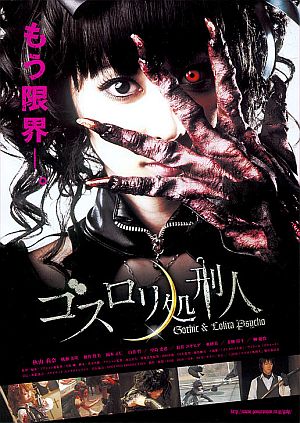 First of all, “Gothic Lolita” is a Japanese style term; Lolita fashion is based on clothing from the Victorian era, and the Gothic sub-genre is…well, suitable for a Victorian funeral, basically. Quite why heroine Yuki (Akiyama) decides to dress like this, after her mother is murdered by a group of five thugs, is never satisfactorily explained. Actually, it’s never even mentioned, putting it alongside the issue of why her father (Yanagi) is apparently a Christian priest, now confined to a wheelchair as a result of the attack. Or where Yuki is now a skilled fighter, armed with a bulletproof, lethal umbrella that can kill you in a variety of ways. Where does she get those wonderful toys, to borrow a phrase.
First of all, “Gothic Lolita” is a Japanese style term; Lolita fashion is based on clothing from the Victorian era, and the Gothic sub-genre is…well, suitable for a Victorian funeral, basically. Quite why heroine Yuki (Akiyama) decides to dress like this, after her mother is murdered by a group of five thugs, is never satisfactorily explained. Actually, it’s never even mentioned, putting it alongside the issue of why her father (Yanagi) is apparently a Christian priest, now confined to a wheelchair as a result of the attack. Or where Yuki is now a skilled fighter, armed with a bulletproof, lethal umbrella that can kill you in a variety of ways. Where does she get those wonderful toys, to borrow a phrase.




 In a dark, grim future, Michelle (Ling) is an assassin, taking out DNA hackers for pay. However, her income is drained as fast as she earns it by her Jackie (Shen), her brother, who has a gambling addiction. To try and pay off his mob debts, he breaks into the apartment of their next-door neighbour, Christian (Newman), a renegade DNA hacker himself, and steals a device on which he was working. The “transcoder” can take a subject’s DNA and, more or less, rewrite it, thereby having the potential to end disease – yet it could also be turned into an enormously destructive weapon. Needless to say, when word gets out that Jackie has this device, everyone wants to get their hands on it.
In a dark, grim future, Michelle (Ling) is an assassin, taking out DNA hackers for pay. However, her income is drained as fast as she earns it by her Jackie (Shen), her brother, who has a gambling addiction. To try and pay off his mob debts, he breaks into the apartment of their next-door neighbour, Christian (Newman), a renegade DNA hacker himself, and steals a device on which he was working. The “transcoder” can take a subject’s DNA and, more or less, rewrite it, thereby having the potential to end disease – yet it could also be turned into an enormously destructive weapon. Needless to say, when word gets out that Jackie has this device, everyone wants to get their hands on it. Taking a minimalist approach to its plot, particularly for the first hour, it’s about Kotomi (Tsukui), who is on a quest to find the man (Kanai) who was responsible for killing her father (Nomura), a samurai who wanted to leave his sklls to her. To reach the killer, she has to battle her way through a series of lower-level minions, such as a pack of ninjas, a monk and Pocahontas [ok, that might be a stretch, but honestly, that was my first thought on seeing her]. However, after she has fought her way past these henchmen and henchwomen, to reach the boss
Taking a minimalist approach to its plot, particularly for the first hour, it’s about Kotomi (Tsukui), who is on a quest to find the man (Kanai) who was responsible for killing her father (Nomura), a samurai who wanted to leave his sklls to her. To reach the killer, she has to battle her way through a series of lower-level minions, such as a pack of ninjas, a monk and Pocahontas [ok, that might be a stretch, but honestly, that was my first thought on seeing her]. However, after she has fought her way past these henchmen and henchwomen, to reach the boss 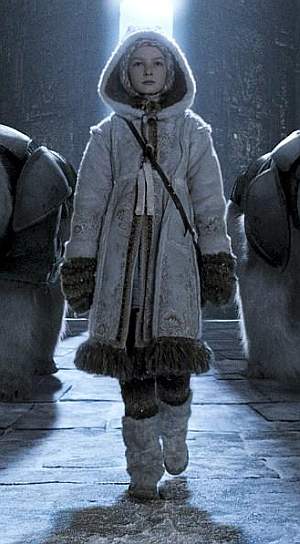 There aren’t that many decent action heroine films for kids: much as I love Bloody Mallory or Kill Bill, they aren’t really child-appropriate. At the other end, films like the Harry Potter or the Narnia series, while containing female characters of some importance, sideline them in favor of the boys. That makes this a refreshing breath of fresh air, in that the heroine is firmly front and center as she goes through her adventures. It’s set in an alternate universe where people’s souls take the form of animals that accompany them everywhere, known as daemons. Childrens’ daemons shapeshift, but adults’ ones are static in form. Things are run by an authoritative group called The Magisterium, but Lord Asriel (Craig) who has found “dust” in a far Northern land, that could challenge the established order – the Magisterium have been kidnapping children for use in human experiments to counter dust. Into this is dropped Asriel’s niece, Lyra Belacqua (Richards), who is given the last golden compass, a device able to answer any question in the right hands. she is about to head North with Mrs. Coulter (Kidman), only to find she has a central role in the kidnapping – as Lyra’s best friend has now vanished, she bravely heads off, initially on her own, to rescue him.
There aren’t that many decent action heroine films for kids: much as I love Bloody Mallory or Kill Bill, they aren’t really child-appropriate. At the other end, films like the Harry Potter or the Narnia series, while containing female characters of some importance, sideline them in favor of the boys. That makes this a refreshing breath of fresh air, in that the heroine is firmly front and center as she goes through her adventures. It’s set in an alternate universe where people’s souls take the form of animals that accompany them everywhere, known as daemons. Childrens’ daemons shapeshift, but adults’ ones are static in form. Things are run by an authoritative group called The Magisterium, but Lord Asriel (Craig) who has found “dust” in a far Northern land, that could challenge the established order – the Magisterium have been kidnapping children for use in human experiments to counter dust. Into this is dropped Asriel’s niece, Lyra Belacqua (Richards), who is given the last golden compass, a device able to answer any question in the right hands. she is about to head North with Mrs. Coulter (Kidman), only to find she has a central role in the kidnapping – as Lyra’s best friend has now vanished, she bravely heads off, initially on her own, to rescue him.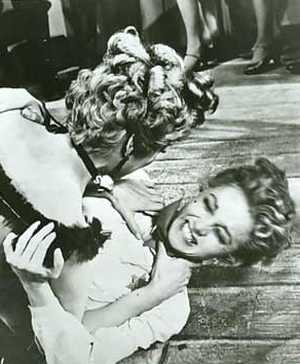 While Corman is better known now as a producer of schlock-horror, he has tried his hand at just about every genre in his time. This was his last stab at the Western, with Garland playing Rose Hood, who takes over as the marshal of Oracle, after her husband is gunned down. However, she incurs the wrath of local saloon-owner Erica Page (Hayes, best known for the title role in Attack of the 50 Ft. Woman), who is running a property-acquisition scheme, based on her hopes for the railroad to come to town. She brings hired killer Cane Miro (Ireland) up from Tombstone, only for him to fall for his intended victim, who is unaware of his mission. Which is surprising, since he is dressed from head to toe in black – even at age seven, when I used to watch The Virginian with my father, I knew this indicated an utterly irredeemable nature.
While Corman is better known now as a producer of schlock-horror, he has tried his hand at just about every genre in his time. This was his last stab at the Western, with Garland playing Rose Hood, who takes over as the marshal of Oracle, after her husband is gunned down. However, she incurs the wrath of local saloon-owner Erica Page (Hayes, best known for the title role in Attack of the 50 Ft. Woman), who is running a property-acquisition scheme, based on her hopes for the railroad to come to town. She brings hired killer Cane Miro (Ireland) up from Tombstone, only for him to fall for his intended victim, who is unaware of his mission. Which is surprising, since he is dressed from head to toe in black – even at age seven, when I used to watch The Virginian with my father, I knew this indicated an utterly irredeemable nature. Not to be confused with the (rather tedious, IMHO) bunch of New York feminist artists, this is about Isabel, the well-educated daughter of a middle-class family, who opts to toss it all away and go into the jungles of Colombia to fight the revolution with FARC, the insurgents who have been rebelling against the government for more than 40 years. She undergoes training, both political and military, and has to adapt to an environment radically different from the one she knew before. It’s not always successful, and you wonder how she’s ever going to become a “freedom fighter” when she can’t even take part in the slaughter of a cow. [shown, below right – PETA activists will
Not to be confused with the (rather tedious, IMHO) bunch of New York feminist artists, this is about Isabel, the well-educated daughter of a middle-class family, who opts to toss it all away and go into the jungles of Colombia to fight the revolution with FARC, the insurgents who have been rebelling against the government for more than 40 years. She undergoes training, both political and military, and has to adapt to an environment radically different from the one she knew before. It’s not always successful, and you wonder how she’s ever going to become a “freedom fighter” when she can’t even take part in the slaughter of a cow. [shown, below right – PETA activists will  e the film-makers didn’t want to go down that avenue, and since they were out in the jungle, with a group of heavily-armed insurgents, I can hardly blame them for letting that angle slide. Instead, it lets the film speak for itself, and FARC does sometimes come across as little better than kids playing soldiers: one, particularly memorable part of the training, consists of recruits running around, waving wooden guns about and shouting “BANG!” at imaginary opponents. They also have a startlingly bad ‘national anthem’, which sounds more like the fight song from a third-rate community college.
e the film-makers didn’t want to go down that avenue, and since they were out in the jungle, with a group of heavily-armed insurgents, I can hardly blame them for letting that angle slide. Instead, it lets the film speak for itself, and FARC does sometimes come across as little better than kids playing soldiers: one, particularly memorable part of the training, consists of recruits running around, waving wooden guns about and shouting “BANG!” at imaginary opponents. They also have a startlingly bad ‘national anthem’, which sounds more like the fight song from a third-rate community college.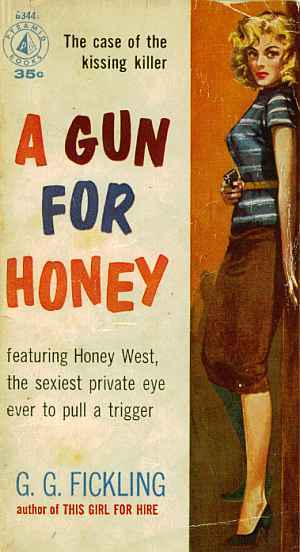 Honey West is best known as the heroine of a mid-60’s TV show created by Aaron Spelling, starring Anne Francis. But her origins actually date back almost a decade further, to a series of pulp detective novels written by Forest Fickling, under the vaguely-pseudonymic name of G.G.Fickling – his wife was Gloria, which may explain the choice. The heroine is a private eye, who follows her father into the profession, after he was killed on the job. These adventures, judging by A Gun for Honey, are rather more hard-boiled, and occasionally risque, than the TV show, though even in the book, the characters never actually seem to do “it”.
Honey West is best known as the heroine of a mid-60’s TV show created by Aaron Spelling, starring Anne Francis. But her origins actually date back almost a decade further, to a series of pulp detective novels written by Forest Fickling, under the vaguely-pseudonymic name of G.G.Fickling – his wife was Gloria, which may explain the choice. The heroine is a private eye, who follows her father into the profession, after he was killed on the job. These adventures, judging by A Gun for Honey, are rather more hard-boiled, and occasionally risque, than the TV show, though even in the book, the characters never actually seem to do “it”.
 Grindhouse harkens back to an earlier time, when the only way to see cult or obscure movies was at your local fleabag cinema or drive-in. There was an entire industry of low-budget studios, like AIP, set up to create product for these outlets: knowing they couldn’t hope to compete in the areas of stars or general quality, they resorted instead to the old stand-bys of sex and violence. They flourished, roughly from the sixties to the end of the seventies, but the steady rise of home-entertainment media spelt their death-knell – at least as far as theatrical releases went. However, their films were an influence on many film-makers, and some of them have teamed up to bring you this love-letter to the genre, of the sort probably not seen for a couple of decades.
Grindhouse harkens back to an earlier time, when the only way to see cult or obscure movies was at your local fleabag cinema or drive-in. There was an entire industry of low-budget studios, like AIP, set up to create product for these outlets: knowing they couldn’t hope to compete in the areas of stars or general quality, they resorted instead to the old stand-bys of sex and violence. They flourished, roughly from the sixties to the end of the seventies, but the steady rise of home-entertainment media spelt their death-knell – at least as far as theatrical releases went. However, their films were an influence on many film-makers, and some of them have teamed up to bring you this love-letter to the genre, of the sort probably not seen for a couple of decades. There’s a fine sense of escalation, from the relatively-subdued opening, through to the insane climax, in which Cherry – now fitted with an automatic weapon in place of a limb which was torn off her during an earlier attack – takes on an entire army of the undead. Ludicrous? Over-the-top? Nonsensical? Hell, yes. Wouldn’t have it any other way. About the only weakness is a tendency to go overboard with the trappings of grindhouse flicks, such as missing reels, scratched film, etc. far beyond the point at which it’s amusing. We get it. I said, we get it. Thank you. Fortunately, the DVD should have the “restored” i.e. un-screwed with version.
There’s a fine sense of escalation, from the relatively-subdued opening, through to the insane climax, in which Cherry – now fitted with an automatic weapon in place of a limb which was torn off her during an earlier attack – takes on an entire army of the undead. Ludicrous? Over-the-top? Nonsensical? Hell, yes. Wouldn’t have it any other way. About the only weakness is a tendency to go overboard with the trappings of grindhouse flicks, such as missing reels, scratched film, etc. far beyond the point at which it’s amusing. We get it. I said, we get it. Thank you. Fortunately, the DVD should have the “restored” i.e. un-screwed with version. This section has the usual problem of Tarantino movies: he’s in love with his own dialogue, especially during an immensely-talky first half. And making the problem worse, the words never seem like they’re coming out of the characters’ mouths, but it is all too easy to imagine Quentin Tarantino saying them. Self-indulgent, meaningless drivel, full of pop culture references, he believes will make you think, “How clever!” – unfortunately, the result is closer to “What a poser!” This gets old really quickly, and when things get going in the second half, it’s a blessed relief. If you need to use the bathroom, quite likely in a 195-minute event like this, early on in Death Proof is definitely the time. You won’t be missing anything at all, and I suspect it might have been better if the two directors here had swapped scripts.
This section has the usual problem of Tarantino movies: he’s in love with his own dialogue, especially during an immensely-talky first half. And making the problem worse, the words never seem like they’re coming out of the characters’ mouths, but it is all too easy to imagine Quentin Tarantino saying them. Self-indulgent, meaningless drivel, full of pop culture references, he believes will make you think, “How clever!” – unfortunately, the result is closer to “What a poser!” This gets old really quickly, and when things get going in the second half, it’s a blessed relief. If you need to use the bathroom, quite likely in a 195-minute event like this, early on in Death Proof is definitely the time. You won’t be missing anything at all, and I suspect it might have been better if the two directors here had swapped scripts. While in English, this came out in Japan, since it was part of a series of translations of popular works, intended as an aid for people learning the language. As a result, the book comes with translation notes at the back explaining, for example, what the phrase “We’re encased in a transparent sheathing of ultrathin reinforced polymer” means. Though I note the word “lesbian” is, apparently, deemed unworthy of further translation. It’s a swift read; discounting the notes, barely 125 pages long, and they’re not large pages either – a lunch-hour might suffice, if your boss gave you a few minutes grace.
While in English, this came out in Japan, since it was part of a series of translations of popular works, intended as an aid for people learning the language. As a result, the book comes with translation notes at the back explaining, for example, what the phrase “We’re encased in a transparent sheathing of ultrathin reinforced polymer” means. Though I note the word “lesbian” is, apparently, deemed unworthy of further translation. It’s a swift read; discounting the notes, barely 125 pages long, and they’re not large pages either – a lunch-hour might suffice, if your boss gave you a few minutes grace.